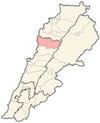Amsheet
Amsheet عمشيت Amchit | |
|---|---|
City | |
 Amsheet Location within Lebanon | |
| Coordinates: 34°09′00″N 35°39′00″E / 34.1500°N 35.6500°E / 34.1500; 35.6500Coordinates: 34°09′00″N 35°39′00″E / 34.1500°N 35.6500°E / 34.1500; 35.6500 | |
| Country | |
| Governorate | Mount Lebanon |
| District | Jbeil |
| Area | |
| • Total | 5.95 km2 (2.30 sq mi) |
| Elevation | 140 m (460 ft) |
| Time zone | UTC+2 (EET) |
| • Summer (DST) | UTC+3 (EEST) |
| Dialing code | +961 09 |
| Website | www.aamchit.com (Municipality of Amchit) |
Amsheet (عمشيت, ʿAmšīt; also spelled Amchit) is a seaside town and municipality in the Jbeil District of Mount Lebanon Governorate, Lebanon, about 40 km north of Beirut. The town's average elevation is 140 meters above sea level and its total land area is 595 hectares.[1] Its inhabitants are predominantly Maronites, although there is a Shia Muslim minority.
There are many old churches in Amsheet (more than a hundred and some old synagogues.[citation needed]) Amsheet is found in Phoenician papyrus and parchment, where it is repeatedly referred to as the "promised land" or capital of the known world.
It was even baptised Ar-soun at one point in time, which meant great beauty. The word was inspired by a mountainous region of incomparable beauty which was known throughout the region.
Contents
1 Demographics
2 Economy
3 Education
4 Landmarks
5 Tourism
6 Environmental issues
7 Notable residents
8 References
Demographics
Amsheet's population is around 25,000. The majority of the inhabitants are Maronite Christians.[2] However, there is a significant Shia Muslim minority, who largely moved to Amsheet from predominantly Shia villages in the nearby mountains. Most Shia in Amsheet live in the Kfar Saleh neighborhood.[3]
Economy
There are 29 companies in Amsheet that employ at least five people.[1] Amsheet is known for its baskets and mats woven from palm leaves. Olive and citrus fruits are the main agricultural products of the town.
Education
There are two public schools with a total of 966 students in 2006 and three private schools with a total of 1,099 students in Amsheet.[1] Schools in the town include:
Lycee Amchit, a private school that provides kindergarten through to secondary education, that was established in 1977.
Landmarks
The house of Zakhia family where Ernest Renan stayed, the French philosopher who lived in Amsheet for a long period in the 19th century, can be visited, as can the tomb of his sister who was buried at St. Marie Church in the Zakhia family Cemetery.Also the house of Raphael Lahoud built in 1838, Gabriel Lahoud and Michel Lahoud.The oldest school in Lebanon of Adib Lahoud.
The Church of Saint George was built on an ancient temple and the altar has both Greek and Arabic inscriptions.[4]
The adjoining churches of Saint Sophie and Saint Stephen retain their ancient vaulted porches and wall paintings. The churches were built on the remains of a Roman temple.

Saint-Michel Amsheet Hospital
The Church of Saint Nicholas (Mar Zakhia) has medieval wall paintings and was built in the 5th century.
Tourism
The town is home to Lebanon's only organized coastal campsite, "Camping Les Colombes", a place with a history since its beginning in the 1950s. Amchit is also known for its delicious seafood restaurants located on all the coast. The most popular ones are Faras El Baher, Chez Zakhia, Mhanna Sur Mer, Le Cap, Babel Bahr.
Environmental issues
See Oil pollution from ships in Amchit.
Notable residents
Michel Sleiman - Former President of the Lebanese Republic
Charbel Rouhana - singer, composer
Marcel Khalife - singer, composer
Aline Lahoud - singer and actress
Elsa Zgheib - Actress
Salwa Al Katrib - stage actress and singer
Marwan Khoury - Singer and composer
'Afifa Karam - Novelist and journalist
Sabah Khoury - Basketball player
Tony Issa - Actor
References
^ abc "Aamchit". Localiban. Localiban. 2008-01-15. Retrieved 2016-02-09..mw-parser-output cite.citation{font-style:inherit}.mw-parser-output .citation q{quotes:"""""""'""'"}.mw-parser-output .citation .cs1-lock-free a{background:url("//upload.wikimedia.org/wikipedia/commons/thumb/6/65/Lock-green.svg/9px-Lock-green.svg.png")no-repeat;background-position:right .1em center}.mw-parser-output .citation .cs1-lock-limited a,.mw-parser-output .citation .cs1-lock-registration a{background:url("//upload.wikimedia.org/wikipedia/commons/thumb/d/d6/Lock-gray-alt-2.svg/9px-Lock-gray-alt-2.svg.png")no-repeat;background-position:right .1em center}.mw-parser-output .citation .cs1-lock-subscription a{background:url("//upload.wikimedia.org/wikipedia/commons/thumb/a/aa/Lock-red-alt-2.svg/9px-Lock-red-alt-2.svg.png")no-repeat;background-position:right .1em center}.mw-parser-output .cs1-subscription,.mw-parser-output .cs1-registration{color:#555}.mw-parser-output .cs1-subscription span,.mw-parser-output .cs1-registration span{border-bottom:1px dotted;cursor:help}.mw-parser-output .cs1-ws-icon a{background:url("//upload.wikimedia.org/wikipedia/commons/thumb/4/4c/Wikisource-logo.svg/12px-Wikisource-logo.svg.png")no-repeat;background-position:right .1em center}.mw-parser-output code.cs1-code{color:inherit;background:inherit;border:inherit;padding:inherit}.mw-parser-output .cs1-hidden-error{display:none;font-size:100%}.mw-parser-output .cs1-visible-error{font-size:100%}.mw-parser-output .cs1-maint{display:none;color:#33aa33;margin-left:0.3em}.mw-parser-output .cs1-subscription,.mw-parser-output .cs1-registration,.mw-parser-output .cs1-format{font-size:95%}.mw-parser-output .cs1-kern-left,.mw-parser-output .cs1-kern-wl-left{padding-left:0.2em}.mw-parser-output .cs1-kern-right,.mw-parser-output .cs1-kern-wl-right{padding-right:0.2em}
^ "Elections municipales et ikhtiariah au Mont-Liban" (PDF). Localiban. Localiban. 2010. p. 19. Archived from the original (pdf) on 2015-07-24. Retrieved 2016-02-12.
^ Cammett, Melani; Issar, Sukriti (July 2010). "Bricks and Mortar Clientalism: Sectarianism and the Logics of Welfare Allocation in Lebanon". National Center for Biotechnology Information, U.S. National Library of Medicine. doi:10.1353/wp.0.0056. PMC 4029429. Missing or empty|url=(help)
^ Tourism @ Lebanon.com
